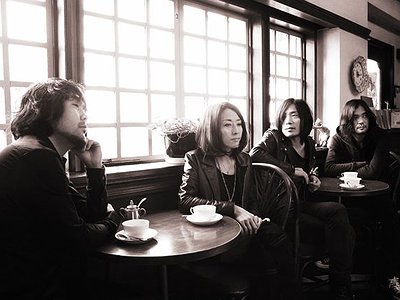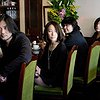The interview was conducted with Takaakira Goto.
When did you start writing/producing music - and what or who were your early passions and influences?
I started learning guitar when I was a kid because my older brother used to play it as a hobby. So I spent most of my teen years practicing and searching for as many records as I could find in our small town. Classical music has always been present in our homes so I think composers like Beethoven became an early influence. Other bands like My Bloody Valentine and Led Zeppelin were also my early influences.
What do you personally consider to be the incisive moments in your artistic work and/or career?
It kind of all blurs together for me, in a positive way though. I want to think of our career as one continuous process. It's not only the beginning, peaks, and ending, but we must appreciate the whole process. Every success and failure has served a purpose.
The moments that stand out for me include the very first overseas show that we played in New York to an empty venue, and then ten years later we played our 10th Anniversary show with the Wordless Music Orchestra in New York to an amazing audience. We feel very thankful when we look back over the years.
What are currently your main compositional- and production-challenges?
We've been very fortunate production-wise. Working with Steve Albini, Henry Hirsch, and Fred Weaver has been a very positive experience. As for composition, I think there will always be challenges because it's so unpredictable and ever-changing. There is a longer gestation period before I sit down to write, and then I begin the process of translating what we hear inside into sound. Learning how to think less and feel more becomes the challenge.
What do you usually start with when working on a new piece?
I start with a mood, an emotion, an image in my mind. In the beginning, I just spew it out and then try to understand it as I go.
How strictly do you separate improvising and composing?
Improvisation is a large part of the creative process. It's a composition exercise to get a feel for what we're trying to create. Once I try several different pieces, then I get a better sense of how the final song should sound like.
How do you see the relationship between sound, space and composition?
Unfortunately, I don't really know because I have never tried to analyse it in that sense. For me, composition is more impulsive and intuitive. If it feels right, then I move forward.
Do you feel it important that an audience is able to deduct the processes and ideas behind a work purely on the basis of the music? If so, how do you make them transparent?
I just want the audience to engage, connect, and decide what the music means to them. I don't think the processes and ideas behind a work are as critical as the emotion and energy the audience may draw from it. It's like when you watch a film and then learn everything about how it was made and see the mechanics behind the scenes. The film loses some of its mystery. I'd rather have the audience experience our music and then dwell in possibility.
In how much, do you feel, are creative decisions shaped by cultural differences – and in how much, vice versa, is the perception of sound influenced by cultural differences?
I think that we unconsciously incorporate Japanese influence into our music. But music transcends these cultural definitions. It’s a beautiful experience to play music on different continents and feel no disconnect between us and the audience. This is the universal language of music.
I think all music and many other art forms, are a bridge that allows people to connect. We’re all in a room sharing the energy of a song, and in that space we remember that all humans derive from the same source.



